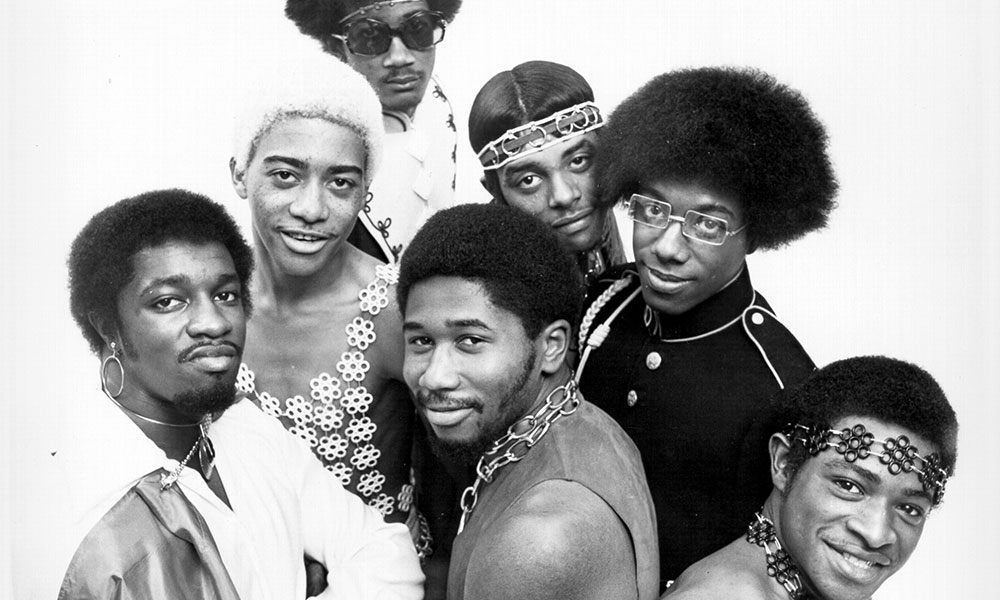The Bar-Kays had gone through hell: most of their members had gone to Heaven, killed in the December 1967 plane crash that claimed the life of Otis Redding. The two surviving members, Ben Cauley (trumpet) and James Alexander (bass), bravely rebuilt the group from scratch, cutting the funky album Gotta Groove in 1969, the same year they played on Isaac Hayes’ breakout record, Hot Buttered Soul. The mid-60s Stax sound they had been so key to creating, as a backing band as well as recording artists, was suddenly looking dated and unambitious. Having seen how Hayes had changed music with his extended symphonic soul performances, and witnessed how rock bands had taken the freedom of the hippie movement to become louder, heavier, and more self-expressive than ever, The Bar-Kays realized their sound had to change if they were to thrive in the 70s. Black Rock, released in February 1971, was the first, vitally important step on a path that would lead to the band becoming one of the most reliable and powerful funk groups of the 70s.
Listen to The Bar-Kays’ Black Rock now.
This is not the fully realized Bar-Kays of their Mercury tenure, nor is it the sound that thrilled 60s soul fans. But it stands on its own merits as a great band finding the key to a new era. The Bar-Kays’ Black Rock may rock, but it also funks, and some of the songs, such as the opening “Baby I Love You,” are deeply soulful. Given a gentler arrangement, it could easily echo the days when the band were backing Memphis’ finest stars. Indeed, the group was now fronted by a singer from a Stax act, Larry Dodson, formerly of vocal group The Temprees. Listen to the horn arrangement and the chord changes before the wild, breakout funky rock middle, and the lengthy guitar solo. This is soul music driven by rock’n’roll ambition; more than eight minutes long, it is as far out as anything Norman Whitfield ever conceived at Motown.
Elsewhere, shades of The Bar-Kays’ work with Isaac Hayes appear on “I’ve Been Trying,” which does for a Curtis Mayfield ballad what the maestro did for “Walk On By,” even using a similar introductory chord progression. A version of Sam & Dave’s “You Don’t Know Like I Know,” which The Bar-Kays had played on, funk-rocks it up in a chunky manner, with a lengthy guitar freak-out.
A take on Sly & The Family Stone’s “Dance To The Music” opens what was Side Two of the original Black Rock vinyl with a psychedelic party groove. “A Piece Of Your Piece” is the least distinguished item here, a hippie-rock tune of no great import. However, the explosive “Six O’Clock News Report” more than makes up for it, full of the sort of hardcore riffing Eddie Hazel might have been proud of. “How Sweet It Would Be” is a return to the group’s soul roots, horns, and organ to the fore. Finally, an out-of-place instrumental version of Bobby Bloom’s cod-reggae hit “Montego Bay” honks along to no great effect, perhaps placed at the back of the LP so you could take it off without spoiling the mood the rest of the record had set up.
Black Rock is flawed, certainly. But this is the way it was back then: there had been remarkably few psycho-funka-rock-adelic experiments by 1971; The Temptations, Funkadelic and The Politicians in the US; Zappatta Schmidt and 32nd Turn Off in the UK (both driven by the remarkable Eddy Grant). None presented an entirely coherent musical statement. Even Sly Stone had not delivered his masterpiece, There’s A Riot Goin’ On, until the end of that year. Nobody knew what the rules were: this remained an experimental medium.
Black Rock has never been as lauded as its competitors, but it’s every bit as strong, powerful, and musically successful. What’s more, it came from a group which had to rebuild from the ground up: not only its sound for the new era, but its personnel. It’s a remarkable statement of its time, of The Bar-Kays’ drive, and of their amazing facility across a variety of styles. And yes, it’s black, and it rocks.




